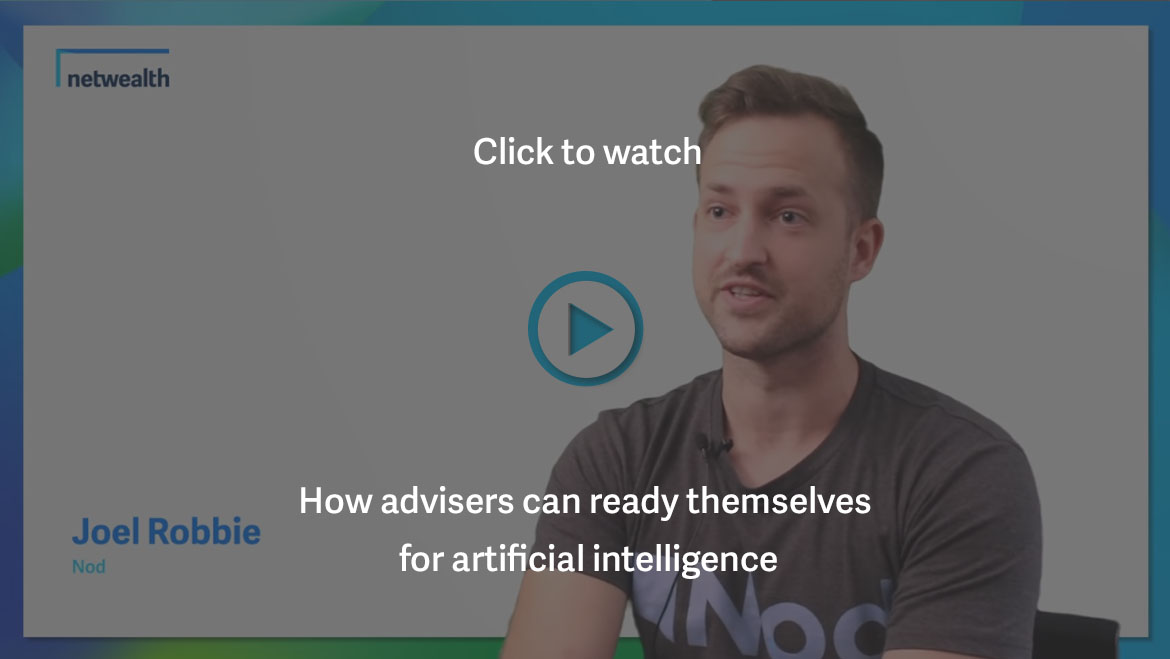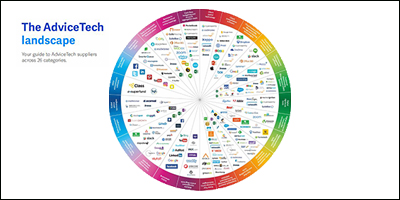Artificial Intelligence is coming but advisers shouldn't be afraid. Joel Robbie, founder and CEO of Nod, explains the opportunities this technology can present and what you can do to prepare yourself and your business for this revolution.
Read the full video transcript
Joel Robbie: I'm Joel and I'm the Founder and CEO of Nod. The Nod is an artificial intelligence platform which writes advice documents for financial planners and accountants, in real-time, in their own language and style. So we use AI to learn from historical statement of advice documents and that sort of thing that have come before, and work out what we need to produce in response for a new client situation, for that particular adviser.
How would you describe AI to the layman?
JR: Artificial intelligence is basically the simulation of human cognitive functions by a computer or a machine, so things like learning are a good example of that. The world of AI is pretty diverse, it often gets talked about as kind of one single thing, there's a few different nuances to it, so you have natural language processing, which is a machine understanding text, as you would as a human being. So you think about you reading the paper in the morning. Essentially it's a computer being able to understand that text, understand the subtext of that text, understand the meaning behind the words that are on the page and how they all fit together into a cohesive whole. Machine learning is an aspect of AI that gets talked about a lot. So that's a machine taking lots of different data points and lots of different outcomes that have happened before, and understanding how to produce a very similar outcome.
Then you've got things like neural networks, which is basically a machine learning kind of by itself, ultimately. The brain, the human brain is made up of lots of synapses, if you ever know about psychology. A neural network is kind of similar, in that it's made up of lots of different data points, lots of different synapses for lack of a better term.
I think another thing that people fail to realise about artificial intelligence is how it's actually built. It's quite different to standard software engineering. It requires more of a data science experimentation approach, as opposed an engineering approach, and what you get in your first pass of build artificial intelligence is definitely not what you're going to end up with, because it requires many hundreds, if not thousands of optimisations to your original models. To give you an insight into the world of Nod and how we have built artificial intelligence, we use an enable model, which is basically using lots of different data science and artificial intelligence models together, in concert with each other, to produce an outcome. So for us we use natural language processing, we use machine learning, and we use deep neural networks, to produce content for our documents.
Hear more from Joel Robbie
What are opportunities for advisers?
JR: I think the best use case for any artificial intelligence platform or product or piece of technology, is always to take away things from work that are not where you add the most value. So if you're a financial adviser, in my view, where you add the most value is in talking to clients, making clients feel good about their financial situation, making sure that the feel like they're world is secure, and anything which takes away from that is a good place to start to think about where they can start to put in some sort of technology, if it's artificial intelligence and start to take away some of that manual work. So for us obviously we think about document generation a lot, and we think that that's a really clear easy use case for artificial intelligence to take away some manual work.
I think there's a really good use case in modeling. So understanding where investments should go. I think ultimately that's a mathematical equation, quite a complex one in some cases, but ultimately it's still math, and I think that's another way that advisers could use artificial intelligence to take away work time, to allow them to help more customers.
What do advisers need to do to ready themselves for AI?
JR: I think one of the best things that advisers can be doing is reading a lot about it. So understanding I think is the first step, how it's going to impact their world. That said, a lot of people have the propensity to get a little bit scared about artificial intelligence and how is it going to change the industry, is my job still going to be around, all that sort of stuff. My personal opinion is that artificial intelligence works best when it's paired with a human. I always say, and I've said it to you, I think, a couple of times, that it's really hard to code for empathy. Empathy is where an adviser's role is now, and I think it will always be that ability to understand a client, empathiSe with them, make them feel better. That's very hard to have a machine replace. So I think get an understanding of it, understand where it can fit into your world and how you can pair with it, because I think once you can do that amazing things can happen.
Learn more about Artificial Intelligence
Read why Advisers shouldn't be afraid of AI and download the 2018 AdviceTech research report.
Recommending reading
AdviceTech Report
A comprehensive view of AdviceTech with special reports, articles, video and podcast interviews.
Glossary of AdviceTech
View a summary of 25 adviser technologies, highlighting key tech providers and benefits to advisers.
Lessons from the US
Find out which US trends in tech and innovation are set to impact the Australian advice industry.
AdviceTech landscape
Get your copy of the logo map created by Netwealth, as featured in the 2020 AdviceTech research report.





